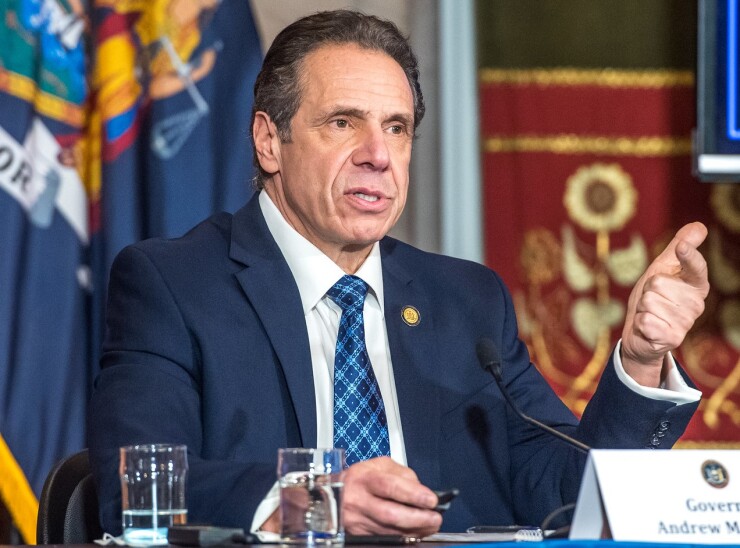Two top lawmakers — who along with New York Gov. Andrew Cuomo comprise the “three people in the room” that hash out the state budget — dropped their support of the embattled governor who faces a rapidly evolving firestorm of misconduct accusations.
Lawmakers must act on Cuomo’s $193 billion
While the Democrat governor faces multiple accusations of sexual harassment and an investigation over an alleged cover-up of COVID-19-related nursing-home deaths, Senate Majority Leader Andrea Stewart-Cousins, D-Yonkers, on Sunday urged Cuomo to resign. Assembly Speaker Carl Heastie, D-Bronx, stopped short of that, but questioned the governor’s ability to lead the state.
Some legislators have called for impeachment and the governor's approval rating is plummeting.
Cuomo told reporters several times in the past week he will not resign. “I was elected by the people of the state, I wasn't elected by politicians,” he said. “I'm not going to resign because of allegations.” At Monday's press conference at Manhattan's Javits Center, a mass vaccination site, he did not refer to any controversies and took no questions.
On Friday, the state legislature curbed some of the emergency powers it granted Cuomo when the pandemic escalated last March. It rescinds his ability to create new COVID-19 directives or extend existing ones without legislative approval. The governor said Sunday he would sign the bill.

Good-government organization Reinvent Albany called the move “a step forward,” but said the rollback bill leaves the governor’s budget-withholding powers untouched, and does not affect pre-COVID emergency powers that enable him to suspend broad sections of law.
"This [rollback] only affects the state's response to COVID — vaccines, closings, restaurant reopenings and virus risk," said Reinvent Albany senior research analyst Rachael Fauss.
Last year, lawmakers granted Cuomo granted four extraordinary budget powers: to reduce planned spending, to withhold payments, to transfer appropriations authority within the state operations bill, and to issue up to $11 billion in short-term debt that could be converted to long-term.
“Unfortunately, the governor has not complied with the budget law, which requires formal cuts and specific notice to the legislature of withheld funding,” she added. “It is now March 2021, the final month of the state’s fiscal year, and the governor has still not presented a formal plan showing how withheld funding will be restored nor final cuts made for individual agencies, local governments and programs.”
This year, the fiscal picture is much clearer and “relatively favorable,” said Andrew Rein, president of the watchdog Citizens Budget Commission.
“The current projected tax revenue shortfalls are half of what was assumed last April and existing and anticipated federal aid will provide significant relief," he said. "Given this clarity, the executive [branch] does not need extraordinary authority. The executive should not be granted extraordinary power to reduce or hold back spending, transfer appropriations unilaterally, or issue debt for operating purposes.”
While Albany staff is fine-tuning the budget for now, Cuomo, Stewart-Cousins and Heastie must meet soon in that proverbial room. Despite Cuomo's reputation for heavy handedness, Fauss believes the current drama could lead to more balanced decision-making in Albany.
Cuomo, a third-term Democrat, released his budget in January. The state received a financial boost over the weekend with the Senate’s 50-49 passage of President Biden’s $1.9 trillion coronavirus rescue package.
Senate Majority Leader Chuck Schumer, D-N.Y., said Sunday that New York State, pending final approval by the House of Representatives, is in store for $12.6 billion, third behind California and Texas, with Florida fourth.
“So much for the blue-state bailout aspect of the debate as the largest shares are split among the colors,” said municipal bond analyst Joseph Krist.
Still. Cuomo would not rule out a tax increase to balance the budget. In January, he asked Washington for $15 billion.
The city would realize $6.1 billion and state counties are in line for $3.9 billion. Small cities, town and villages in the state would receive $825 million while the bill would earmark $358 million for the state’s broadband program.
The Metropolitan Transportation Authority, which operates mass transit in the city, would receive about $6 billion. On Monday,
According to the Assembly’s
“There should be no fungibility of state dedicated funds, and receipt of federal aid cannot be an excuse for the state to raid or withhold dedicated transit funding,” Fauss said.
Moody’s Investors Service rates the state’s general obligation bonds Aa2 with a stable outlook. S&P Global Ratings and Fitch Ratings each assign AA-plus with negative outlooks.





